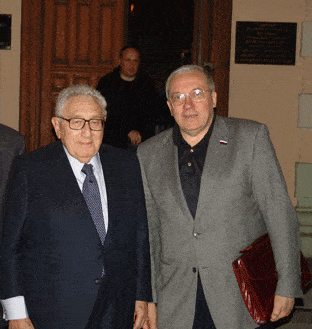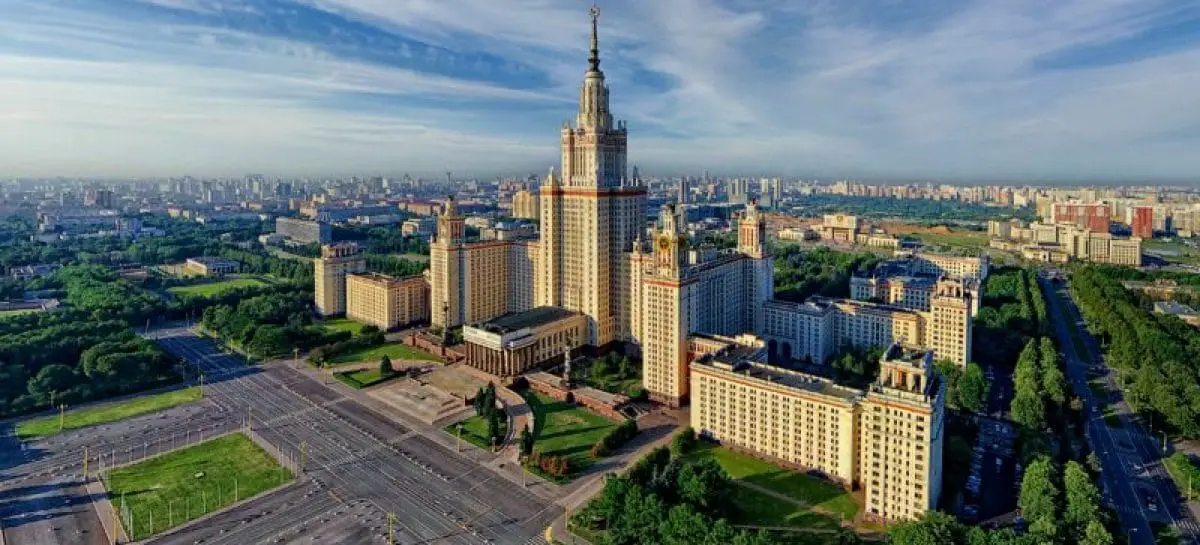Below, Olga discusses what a first year freshman experiences on day one of their college education. The day offers no classes. It is instead filled with speeches, handshakes, and status symbols. All of this is highly indicative of the role of formality and ceremony in Russian education and Russian society.
This resource is part of a series of free Russian lessons sponsored by SRAS called Olga’s Blog. The blog documents – in simplified, modern Russian – Olga’s experience finishing high school, starting college, and living life in Moscow in 2006-2007. The text, links, and format of this resource were last updated in 2023.
Briefly on the Role of Formalism and Ceremony in Russia
In the text below, Olga describes her first day as an undergraduate in Russia. It is a day filled with formal ceremonies and speeches, inducting the students into the university structure and reminding them of the responsibilities and privileges that come with that.
Formalism and ceremony play significant roles in the Russian language and culture.
Those who have studied the Russian language will know that it has specific grammatical forms for showing respect and formality. Those with more experience with the language and culture will know the importance placed on ceremonial speech in many situations. The best known of these are toasts which are given impromptu at nearly any gathering of any importance including baptisms, weddings, and funerals but also extending to company meetings, holiday gatherings, and even group dinners with friends. These often have traditional expressions and phrases that help structure the speeches but are also known for using poetic language and symbolism.
Being able to effectively use formal speech is essential for maneuvering inside Russian society. While in America, for instance, public employees and sales staff are excepted to be polite and diligent in providing what the client needs, in Russia you will find these people are often less than helpful unless they are addressed with the perquisite etiquette and politeness. In fact, in the text below, Olga describes sitting through the various speeches and discussing with honor the fact that her group was addressed by such important individuals, but in the end, politely sitting through the day of ceremony was a perquisite to getting the student card, which grants access to the university, but which is also a status symbol for the students within Russian society.
One could also argue that this tendency toward formalism and ceremony extend beyond language and encompass visual aesthetics as well. Grandeur, symmetry, and ornamentation can be seen in much of Russia’s classic architecture, art, and design. From ornate palaces to elaborate religious icons, the visual expressions often reflect a sense of formalism and ceremony.
First Day of University: Simplified Russian Text from Olga’s Blog
This is Lesson 11 of Olga’s Blog, a series of intermediate Russian lessons.
Note that:
- All of the bold words and phrases have annotation below.
- Red words and phrases indicate the subject of this blog entry’s grammar lesson.
- *Asterisks indicate slang.
Дорогие друзья!
Я много рассказала о моем первом семестре в МГУ – о вступительных экзаменах, учебе и даже о том, как я заболела и как мне потом пришлось наверстывать то, что пропустила. В этот раз хочется рассказать вам про свой самый первый день в университете. Почему именно про него? Говорят, что путь в тысячу миль начинается с одного шага.
И первого сентября я сделала первый шаг в совершенно новую, еще неизведанную, но полную удивительных открытий студенческую жизнь. Вот как все было:
Зайдя в первый Гуманитарный корпус МГУ и поднявшись по лестнице, мы попали в актовый зал. Вскоре разговоры утихли, и все с ожиданием и интересом начали слушать речи учителей и руководителей. Выступали Виктор Антонович Садовничий – главный ректор МГУ, и Андрей Афанасьевич Кокошин – декан факультета мировой политики.

Они рассказывали о том, что в этом году мы будем изучать самые разные и интересные предметы. Еще говорили, что учиться – сложно, и чтобы добиться результатов, нужно много заниматься.
Слушая многочисленные наставления и поздравления, мы никак не могли дождаться самого интересного – вручения студенческих билетов. Студенческие билеты означают, что мы официально становимся частью университета и получаем доступ во все его здания и ко всем его ресурсам.

И тут к столу подошел Кокошин*, достал список студентов и начал вызывать нас по очереди. Ребята подходили к нему, получали свои студенческие билеты и счастливые садились обратно на свои места в зале. Каждому студенту Кокошин пожимал руку. Когда у меня наконец оказался мой билет – маленькая книжка, где на серой твердой обложке нарисовано главное здание МГУ, я с нетерпением открыла его и прочла – «Факультет мировой политики. Форма обучения – дневная. Дата выдачи билета – 01.09.06.» Еще внутри была моя фотография и синяя печать МГУ. С этого момента началась моя студенческая жизнь. Лекций никаких на этот день назначено не было, и пока можно было отдохнуть.
В следующий раз я подробнее расскажу Вам о том, как я провожу свободное от учебы время. Расстаемся ненадолго!
Пока!
Vocabulary and Cultural Annotations
Я много рассказала о моем первом семестре в МГУ: I’ve told much of my first semester at MGU.
Наверстывать/наверстать (что-л.): To make up (for); to catch up with.
Путь в тысячу миль начинается с одного шага: A journey of a thousand miles begins with a single step. This is a proverb occurs in both Russian and English speaking cultures, having originated in the writings of the Chinese philosopher Lao-tzu. In a Russian, another variant also occurs: Путь в тысячу миль начинается с первого шага (a journey of a thousand miles begins with the first step). In English, a second variant also occurs: the journey of a thousand leagues begins from beneath your feet. This is largely due to difficulties in translating the phrase.
Aктовый зал: Assembly hall.
И первого сентября я сделала первый шаг в совершенно новую, еще неизведанную, но полную удивительных открытий студенческую жизнь: On the first of September, I made the first step toward a completely new student life, still unexplored, but full of wondrous discoveries. Note that the word order here may make this fairly simple phrase hard to decipher for English speakers, as English discourages separating the object from the verb with so many modifiers. The structure, however, is perfectly acceptable in Russian.
Разговоры утихли: The conversations quieted. Утихать/утихнуть (что-л.) – to quiet, abate, fade, fall, or calm.
Виктор Антонович Садовничий: Victor Antonovich Sadovnichii. Victor Antonovich has been the rector (the highest post at a Russian University) of MGU since 1992. He holds a doctorate in Applied Mathematics from that university. He is a member of the Presidium (ruling body) of the Russian Academy of Sciences. He has written several textbooks on mathematics and continues to write and research in addition to serving as rector for Russia’s largest university.
Андрей Афанасьевич Кокошин: Andrei Afanasevich Kokoshin. Andrei Afanasevich was the dean of the MGU’s Faculty of World Politics since its inception in 2003 until 2019. He holds a doctorate in history and is a member of the Russian Academy of Sciences and has been active in the Russian Duma as a representative of ruling United Russia party. He is active in bringing international figures (such as Henry Kissenger, see photo above) to MGU.
Кокошин: Kokoshin. Note that when Russian students speak only among themselves, referring to professors and others in positions of authority by their last names is accepted and appropriate. However, if speaking to the people themselves, they would use the formal construction of “name+patronymic.” So, if you ever meet Andrei Afanasevich Kokoshin, you should call him “Andrei Afanasevich.”
Каждому студенту Кокошин пожимал руку: Kokoshin shook hands with each student. Many Russians still hold to the old-fashioned view that women should not shake hands. Greetings have usually involved men shaking hands and women being acknowledged with a small bow or a nod. The rector of MGU is apparently slightly more progressive than some.
Маленькая книжка: small book. While nearly every form of ID in western countries takes the form of a small credit-card-sized card, in Russia, ID is usually larger. Drivers’ licenses are often the size of a large index card (although smaller, plastic versions are now being issued). All citizens and foreigners are expected to carry passports (originals) at all times. Russian passports are roughly equivalent in size to American passports, but are usually made even more bulky by placing them in leather covers to keep them from being worn too much. Student cards are about the size of two credit cards lain end-to-end, and made of thick cardboard that folds in the middle.
Назначено: planned, appointed, or designated.
Расстаемся ненадолго: We shall not be separated long! Расставаться/ расстаться (с кем-л./чем-л.): to part, separate, leave, or give up. This phrase, sometimes uttered when close friends part, is generally quite affectionate
Grammar Focus: Verbal Adverb (Adverbial Participles)
The first lessons of Olga’s Blog (1.1 – 1.5) discussed adjectival participles wherein verbs can be conjugated to be used as adjectives. Verbs in Russian can also be made into adverbs, as this month’s blog entry shows. Adverbs formed in this manner are known as verbal adverbs or adverbial participles.
The verbal adverb is a verbal form which has features of both the verb and the adverb.
Verbal Features and General Usage
May be transitive. Он сидел в саду, читая книгу. (He sat in the garden, reading a book.) In this case “reading” modifies the verb “sat,” telling us more about the circumstances of the action.
May be intransitive (with no direct object). Imperfective verbal adverbs are often used in literary and scientific texts, but they are almost never used in conversational speech. They are used when there is an attendant action simultaneously with the main action expressed by the predicate verb. Today’s Olga’s Blog gives an example of this: Слушая многочисленные наставления и поздравления, мы никак не могли дождаться самого интересного – вручения студенческих билетов. (While listening to the many instructions and congratulations, we could hardly wait for the most interesting thing – the distribution of the the student ID cards).
May take the particle -ся- (to indicate reflexive action): купаясь (while bathing [oneself]), встречаясь (while meeting [together with others]).
Retains the aspect (perfective or imperfective) of the verb from which it is formed. There are two aspects of verbal adverbs – imperfective which indicates that the action of the main verb takes (took) place simultaneously with that of the verbal adverb, and perfective (past verbal adverb) which indicates that the action denoted by the adverbial participle preceded that of the main verb. Today’s Olga’s Blog gives examples of both forms: Зайдя (imperfective) в первый Гуманитарный корпус МГУ и поднявшись (perfective) по лестнице, мы попали в актовый зал. (Entering the First Humanitarian Corpus of MGU and having climbed the stairs, we found ourselves in the assembly hall.)
Они сидели за столом, спокойно беседуя. (They were sitting at the table chatting quietly [for some time]) – imperfective.
Побеседовав, они разошлись. (After chatting, they parted.) – perfective.
Adverbial features: Like the adverb, the verbal adverb is used as an adverbial modifier, i.e. it shows the circumstances (how, when, why, under what conditions).
Rules of Formation
Imperfective verbal adverb is formed by adding -а/я to the stem. “-a” will come after soft consonants, while “aя” follows hard consonants.
слышать (to hear) – слыша (while hearing)
читать (to read) – читая (while reading)
Imperfective verbal adverb is formed by adding “-в,” or “-вши” to the stem after a vowel and “–ши” after a consonant.
– прочитать (to read [completely]) – прочитав or прочитавши (having read)
принести (to bring [to its final point]) – принесши (having brought).
Note that the forms “-в,” and “-вши” are equivalent. Most often, people will use the shorter “-в.”
Examples from Literature and the Press:
Cлушая ее, Подгорин думал о прошлом и вспоминал, что и сам он, когда был студентом, знал наизусть много хороших стихов и любил читать их. А. Чехов
Ты разве не спишь? – спросил ее брат, но она, не ответив ему ни слова, пробежаламимо. И. Тургенев
Идя по улице, она говорила себе: “Зачем я пошла к адвокату?” А. Аверченко
Махнув руками, Афонька затянул песню. И. Бабель
More Free Russian Lessons From Olga’s Blog

The Language and History of Caviar: Olga’s Blog
Olga below describes the place of caviar in Russian food culture. In simplified Russian, she describes where the delicacy is harvested from, the major types of caviar, and how the types differ in cost and quality. We also provide an English primer below discussing more of the history of caviar, how it is eaten and […]

Mushrooms in Cultures and Cuisines: Olga’s Blog
Olga below continues her discussion of the deeply held place that mushrooms have in Russian culture. In part one of this discussion, she focused on how and where and find the mushrooms. In part two, below, she discusses how the mushrooms are preserved, prepared, and consumed. A staple of the regional diet for centuries, mushrooms […]

Mushroom Season Has Begun! Olga’s Blog
Olga below discusses the deeply held national tradition of mushroom gathering. An important part of Russian food tradition for many centuries, Russian children are taught in school from an early age to tell the difference between various types of native mushrooms. Many, like Olga, will go with relatives and friends to the woods to put […]

Study Abroad in America for Russians: Olga’s Blog
As part of her major program in international relations at Moscow State University, Olga applied to study abroad in the United States in 2007. As was not uncommon for students applying for study abroad in either direction, Olga hit several bureaucratic snags. What is perhaps most remarkable about the below text, however, is the description […]

What is the First Day of University Like in Russia? Olga’s Blog
Below, Olga discusses what a first year freshman experiences on day one of their college education. The day offers no classes. It is instead filled with speeches, handshakes, and status symbols. All of this is highly indicative of the role of formality and ceremony in Russian education and Russian society. This resource is part of […]




